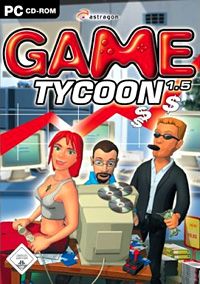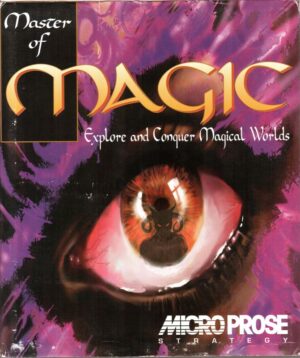Retro Replay Review
Gameplay
Game Tycoon places you at the helm of a fledgling game studio, inviting you to navigate every crucial decision in the game development lifecycle. From selecting one of 13 genres to gauging the zeitgeist—where platformers might eclipse adventures in one era but cede ground to RPGs in another—each choice influences your studio’s success. The core loop is simple yet strategic: pick a genre, decide on a graphics engine (license or build in-house), assemble your team, and chart your course to release day.
(HEY YOU!! We hope you enjoy! We try not to run ads. So basically, this is a very expensive hobby running this site. Please consider joining us for updates, forums, and more. Network w/ us to make some cash or friends while retro gaming, and you can win some free retro games for posting. Okay, carry on 👍)
The decision between licensing an existing engine or investing time and money to build your own is more than cosmetic. A licensed engine lets you ship quickly, but a custom engine offers long-term savings and unique graphical flair at the cost of extended development times. Choosing the right balance between cost, time, and creative freedom becomes a recurring dilemma that keeps you engaged, especially as development cycles expand from months in the 1980s to years in the modern era.
The pacing of Game Tycoon is real-time and unhurried, reflecting the true timespan of game production. You assign tasks—programming, art, music—set testing schedules, negotiate with distributors, and coordinate marketing campaigns all while your avatar strolls through 1980s-style city streets to access menus. This deliberate pace stands in contrast to frantic business sims, offering a meditative experience for players who enjoy planning and watching their projects unfold over extended periods.
Graphics
Graphically, Game Tycoon leans into a clean, functional aesthetic that prioritizes information over flash. The user interface is reminiscent of classic business sims, with clear icons for employees, budgets, and project milestones. While it doesn’t push modern GPU boundaries, the UI is intuitive, ensuring you always know exactly where to click to hire an artist or adjust your marketing spend.
The choice of graphics engine you make in pre-production has a tangible impact on your games’ appearance. Licensed engines come with a fixed set of visual styles, which can feel familiar but sometimes limit your studio’s brand identity. Conversely, programming your own engine unlocks custom shaders and unique artistic touches. Watching your proprietary engine evolve over multiple projects adds a sense of pride, even if the initial time investment is substantial.
The cityscape where your avatar wanders is rendered in charming pixel art, evoking the era’s arcade cabinets and early home consoles. Though not groundbreaking, the background details—billboard advertisements for fictitious titles, street-side arcades, and retro office environments—immerse you in the game development world from 1982 through to the DVD era. This consistent visual theming reinforces the nostalgic mood without distracting from core management tasks.
Story
While Game Tycoon doesn’t feature a traditional narrative, it tells an emergent story through your studio’s journey. Starting in 1982 with modest ambitions, you experience the industry’s technological leaps—from cartridge to CD, 2D to 3D, and beyond. Each era brings new challenges: changing player tastes, rising development costs, and evolving distribution channels, such as the shift from brick-and-mortar retailers to digital storefronts.
The two modes—ten structured missions and open-ended free play—offer different storytelling approaches. Missions guide you through specific historical milestones (e.g., launching a blockbuster console title or surviving a market crash), while free play lets you carve your own path. Both modes reward adaptability: a mission might task you with mastering RPGs in the early ’90s, while free play can see you experimenting with virtual reality titles in the modern age.
Character interactions are sparse, but the game speaks through its statistics and magazine reviews. Reading your first glowing “Hit of the Month” review or seeing sales graphs climb after a successful marketing campaign provides emotional highs. Conversely, a negative review or a failed engine launch delivers dramatic tension, reminding you that in the volatile video game market, one misstep can set your studio back years.
Overall Experience
Game Tycoon excels as a business simulation that doubles as a homage to video game history. Its steady pacing allows for thoughtful decision-making without the stress of real-time crises. The strategic depth—balancing genre trends, engine investments, staffing, and marketing—keeps you invested over dozens of in-game years. Whether you prefer following mission objectives or crafting your own indie empire, the game offers meaningful goals.
Some players may find the routine of project-based development repetitive after extended play, as each game follows the same broad phases: concept, engine decision, staffing, testing, distribution, and review. However, the shifting market conditions and licensing vs. proprietary engine trade-offs inject fresh dilemmas that lessen any sense of monotony. The nostalgic pixel art cities and thoughtful UI design reinforce the game’s theme without overwhelming it.
For simulation enthusiasts and video game history buffs alike, Game Tycoon delivers a rich, era-spanning management experience. Its deliberate tempo and emergent storytelling through market successes and failures make for a compelling ride. If you’ve ever dreamed of running your own game studio and guiding it from 8-bit beginnings to modern blockbusters, Game Tycoon provides a polished, engaging sandbox to realize that ambition.
 Retro Replay Retro Replay gaming reviews, news, emulation, geek stuff and more!
Retro Replay Retro Replay gaming reviews, news, emulation, geek stuff and more!




Reviews
There are no reviews yet.